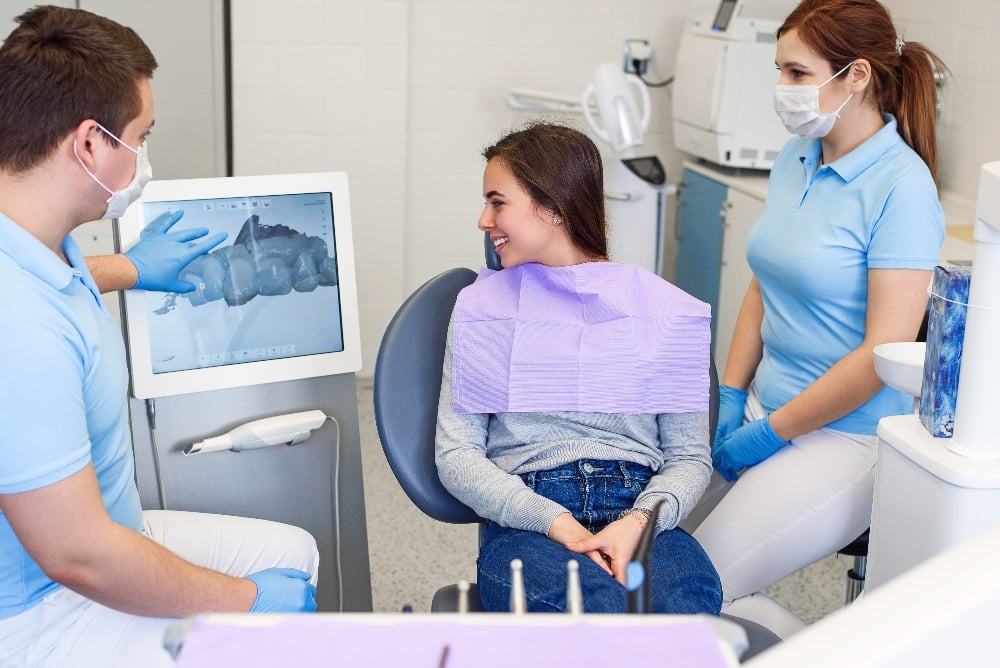Posted by Amy Carbone on Feb 12, 2020 9:00:00 AM
Dentists use communication skills every day to interact with patients, but are you conveying your desired message well enough to achieve your goals? Here's how you can try to boost your dental practice performance with solid communication techniques.
Maintain Eye Contact with Patients
Eye contact is the very foundation of good communication; it lets patients know where your attention is. Looking through a patient's chart as they're giving their chief complaint saves time and seems like a good idea, especially if you're good at multitasking and don't miss a beat when your patient is speaking to you. Regardless of your ability to do so, however, diverting your gaze from your patient while they're speaking can make them feel like you aren't listening.

Use Body Language to Communicate Engagement
Your body language also communicates to your patient if you're actively engaged in what they're saying. Angle your body towards your patient and leave your arms open; avoid the temptation to cross them. You may want to hold a clipboard or another object to remind you to keep your body language accessible.
Wait to Respond
More than anything else, patients who come to your dental office want to be heard. They want to be understood and validated, and interjecting while they're still trying to tell you what's wrong does the exact opposite. Wait to respond until your patient has finished speaking to build their trust and give them the sense that you care about their experience. This can seem difficult or even impossible in busy practices, but rushing patients through their chief complaint can drastically impact treatment acceptance rates.
Summarize What You Heard
Repeat back to your patient what you heard them say in roughly your own words. Summarize their chief complaint and ask if you're correct. Allow your patients the opportunity to rectify anything you may have misunderstood or that they communicated to you in error.
Ask Follow-Up Questions
Don't be afraid to ask patients to clarify something you didn't understand or hear, or to give more details about their problem. In fact, asking a follow-up question or two after patients give their chief complaint is a good customer service habit to get into; it confirms to patients that you were, in fact, listening to them and that you're interested in their experience.

Present Treatment Options
Once you've built the patient's trust and completed your initial dental exam, you'll present available treatment options. How you do this greatly impacts what treatment your patient chooses or if they deny treatment altogether and seek a second opinion. Most patients today are wise to sales tactics used by dental professionals to solicit treatment acceptance, so it's crucial that you simply present the options as fairly as possible. Point out the benefits and drawbacks of each and allow the patient to make their own decision.
Explain to Patients What You're Doing and Why
As you go through the exam or recommended procedure, be sure to narrate what you're doing to your patient and why. For example, if you're using CAD/CAM imaging, you should use the opportunity to educate the patient about what dental technology you use and why you chose CAD/CAM for this particular case. You can also use the opportunity to explain to patients what they can expect during their exam or treatment.
Ask Patients for Consent
Another great way to build patient trust is to ask for consent. After you've discussed the procedure with your patient and why it's needed, ask for consent. Don't assume that because they need the treatment that they'll accept; instead, be clear that the decision is– and always was– their own. You can also practice asking for consent throughout exams and procedures, such as asking a patient if it's okay for you to do something instead of simply informing them that it's going to happen. Of course, consent in this context may be distinct from the consent that you may be legally required to obtain.
Why Are Good Communication Skills So Important for Dentists to Use?
Even today some dentists may not understand how critical robust communication skills are on the job. After all, it's not at the forefront of most dental curriculums. Unfortunately, how well you are able to communicate with your patients– and your office staff– may directly impact your dental practice's bottom line.
By learning to communicate effectively, you may be able to boost treatment acceptance, efficiently direct your staff, and increase the overall performance of your practice. Pay attention to how you talk to patients, your tone of voice, and your body language. Notice if you interrupt them or chart while they talk to you. Make a focused effort to improve your communication and hopefully watch your practice begin to reap the benefits.
About Treloar & Heisel
Treloar & Heisel is a premier financial services provider to dental and medical professionals across the country. We assist thousands of clients from residency to practice and through retirement with a comprehensive suite of financial services, custom-tailored advice, and a strong national network focused on delivering the highest level of service.
Treloar & Heisel and Treloar & Heisel Property and Casualty are all divisions of Treloar & Heisel, LLC.
Insurance products offered through Treloar & Heisel, LLC.
Treloar & Heisel, LLC. and its divisions do not offer legal advice. Please consult a professional concerning this topic.


